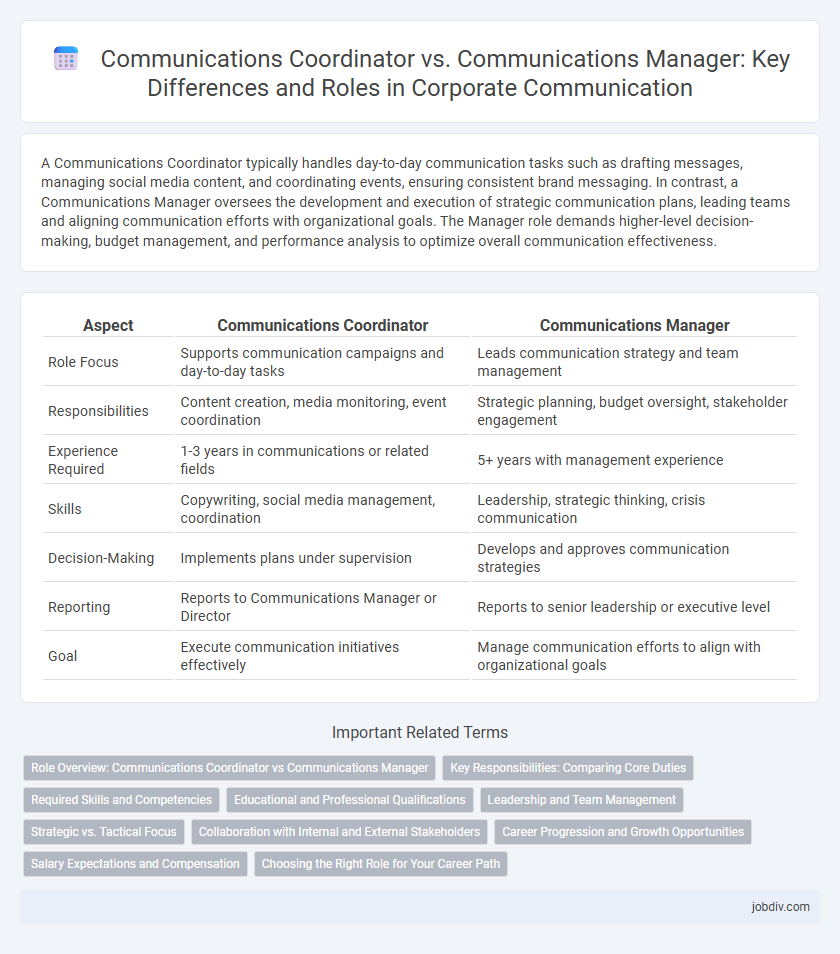A Communications Coordinator typically handles day-to-day communication tasks such as drafting messages, managing social media content, and coordinating events, ensuring consistent brand messaging. In contrast, a Communications Manager oversees the development and execution of strategic communication plans, leading teams and aligning communication efforts with organizational goals. The Manager role demands higher-level decision-making, budget management, and performance analysis to optimize overall communication effectiveness.
Table of Comparison
| Aspect | Communications Coordinator | Communications Manager |
|---|---|---|
| Role Focus | Supports communication campaigns and day-to-day tasks | Leads communication strategy and team management |
| Responsibilities | Content creation, media monitoring, event coordination | Strategic planning, budget oversight, stakeholder engagement |
| Experience Required | 1-3 years in communications or related fields | 5+ years with management experience |
| Skills | Copywriting, social media management, coordination | Leadership, strategic thinking, crisis communication |
| Decision-Making | Implements plans under supervision | Develops and approves communication strategies |
| Reporting | Reports to Communications Manager or Director | Reports to senior leadership or executive level |
| Goal | Execute communication initiatives effectively | Manage communication efforts to align with organizational goals |
Role Overview: Communications Coordinator vs Communications Manager
A Communications Coordinator supports the execution of communication strategies through content creation, media scheduling, and stakeholder engagement, emphasizing operational tasks and timely information flow. In contrast, a Communications Manager drives the development and oversight of comprehensive communication plans, managing teams and aligning messaging with organizational goals for broader impact. The Coordinator focuses on tactical implementation, while the Manager handles strategic leadership and cross-functional collaboration.
Key Responsibilities: Comparing Core Duties
Communications Coordinators typically handle the execution of communication plans, including drafting content, managing social media accounts, and coordinating events to support messaging strategies. Communications Managers oversee the development and implementation of comprehensive communication strategies, lead teams, analyze campaign performance, and liaise with stakeholders to ensure alignment with organizational goals. Both roles require strong communication skills, but Managers focus more on strategic planning and leadership, whereas Coordinators emphasize operational tasks and content delivery.
Required Skills and Competencies
Communications Coordinators require strong organizational skills, proficiency in content creation, social media management, and basic project coordination to support communication strategies effectively. Communications Managers need advanced skills in strategic planning, team leadership, crisis communication, analytics interpretation, and stakeholder engagement to drive comprehensive communication initiatives. Both roles demand excellent written and verbal communication abilities, attention to detail, and adaptability to evolving media landscapes.
Educational and Professional Qualifications
Communications Coordinators typically hold a bachelor's degree in communications, public relations, or journalism with 1-3 years of relevant experience, focusing on executing communication strategies and managing daily content. Communications Managers usually require a bachelor's or master's degree in a related field and 5+ years of professional experience, emphasizing strategic planning, team leadership, and campaign development. Advanced certifications in digital marketing, media relations, or project management enhance qualifications for both roles in dynamic communication environments.
Leadership and Team Management
Communications Managers lead strategic planning and oversee multiple communication projects, demonstrating advanced leadership skills to coordinate diverse teams and ensure cohesive messaging. Communications Coordinators support these efforts by managing daily communication tasks and facilitating collaboration among team members, focusing on execution and operational support. Effective team management in both roles involves aligning communication goals with organizational objectives while fostering clear internal communication and employee engagement.
Strategic vs. Tactical Focus
A Communications Coordinator typically handles tactical tasks, such as developing content calendars, managing social media posts, and coordinating events to support the overall communication plan. In contrast, a Communications Manager focuses on strategic initiatives, including shaping messaging frameworks, aligning communication goals with business objectives, and overseeing the evaluation of campaign effectiveness. While Coordinators execute specific actions, Managers drive long-term communication strategies that influence organizational direction.
Collaboration with Internal and External Stakeholders
A Communications Coordinator facilitates seamless collaboration by managing day-to-day interactions and ensuring consistent messaging between internal teams and external partners. A Communications Manager oversees strategic communication initiatives, aligning stakeholder interests and coordinating cross-departmental efforts to enhance organizational goals. Together, they optimize stakeholder engagement through tailored communication plans and effective relationship management.
Career Progression and Growth Opportunities
Communications Coordinators typically handle tactical execution of communication plans and support content creation, gaining foundational skills in media relations and digital platforms. Progressing to a Communications Manager position involves taking on strategic responsibilities such as leading campaigns, managing teams, and aligning communication goals with organizational objectives. Career growth opportunities expand significantly at the managerial level, including higher salary potential, leadership development, and involvement in cross-functional projects.
Salary Expectations and Compensation
Communications Managers typically earn higher salaries than Communications Coordinators due to their increased responsibilities, with median annual salaries around $75,000 compared to $50,000 for Coordinators. Compensation packages for Managers often include performance bonuses and expanded benefits, reflecting their strategic role in overseeing communication campaigns and teams. Coordinators generally receive base salaries with fewer incentives, focusing on executing communication tasks under managerial supervision.
Choosing the Right Role for Your Career Path
Communications Coordinators typically handle day-to-day operational tasks such as managing content, social media, and event logistics, making this role ideal for gaining hands-on experience in communication strategies. Communications Managers oversee broader strategic planning, team leadership, and project coordination, positioning themselves for higher-level decision-making and greater organizational impact. Selecting between these roles depends on whether you aim to build foundational skills as a coordinator or pursue leadership and strategic influence as a manager.
Communications Coordinator vs Communications Manager Infographic

 jobdiv.com
jobdiv.com